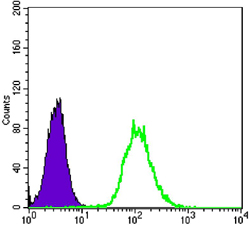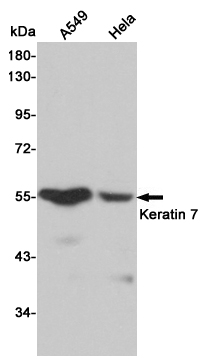-
Product Name
Anti-Cytokeratin 7 (6E10) Mouse antibody
- Documents
-
Description
Cytokeratin 7 (6E10) Mouse monoclonal antibody
-
Tested applications
WB, FC
-
Species reactivity
Human
-
Isotype
Mouse IgG1
-
Preparation
Antigen: Purified recombinant fragment of human CK7 expressed in E. Coli.
-
Clonality
Monoclonal
-
Formulation
Ascitic fluid containing 0.03% sodium azide.
-
Storage instructions
Store at 4°C short term. Store at -20°C long term. Avoid freeze / thaw cycle.
-
Applications
WB: 1/500 - 1/2000
FC: 1/200 - 1/400
ELISA: 1/10000
-
Validations

Flow cytometric analysis of Hela cells using anti-CK7 mAb (green) and negative control (purple).

Western blot detection of Keratin 7 in A549 and Hela cell lysates using Keratin 7 mouse mAb (1:500 diluted).Predicted band size:51KDa.Observed band size:51KDa.
-
Background
Swiss-Prot Acc.P08729.CK7 (Keratin, type II cytoskeletal 7) is a protein that in humans is encoded by the KRT7 gene. CK7 is a member of the keratin family. It is specifically expressed in the simple epithelia lining the cavities of the internal organs and in the gland ducts and blood vessels. The protein encoded by this gene is a member of the keratin gene family. The type II cytokeratins consist of basic or neutral proteins which are arranged in pairs of heterotypic keratin chains coexpressed during differentiation of simple and stratified epithelial tissues. This type II cytokeratin is specifically expressed in the simple epithelia lining the cavities of the internal organs and in the gland ducts and blood vessels. The genes encoding the type II cytokeratins are clustered in a region of chromosome 12q12-q13. Alternative splicing may result in several transcript variants; however, not all variants have been fully described.
Related Products / Services
Please note: All products are "FOR RESEARCH USE ONLY AND ARE NOT INTENDED FOR DIAGNOSTIC OR THERAPEUTIC USE"
